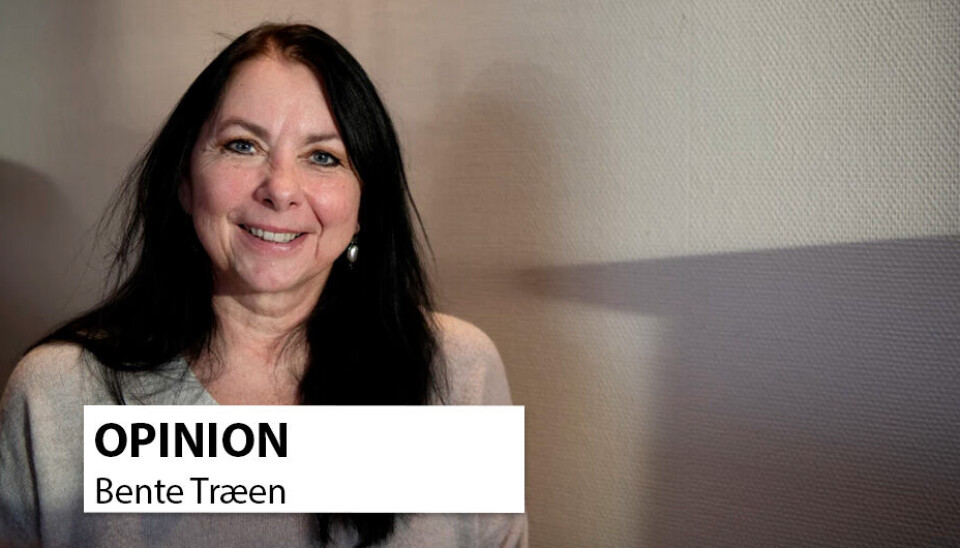
Bente Træen had cancer surgery: "What will this mean for my sex life?"
OPINION: When you’re a patient, you're not exactly at the top of your game. And yet healthcare personnel expect patients to take the initiative in talking about their most intimate issues. It goes without saying that this doesn’t work.
I recently participated in a type of involuntary fieldwork. I had surgery for colon cancer. With that came a stoma – admittedly of a temporary nature – and a long surgical wound. When I thought about it, this event seemed to foretell the end of all my future erotic life.
Ideal and practice
I undressed and looked at the ageing woman in the mirror – with a grey bag stuck to her stomach. She stared back, arousing emotions in me, and all I could think was ‘ugly’ and ‘the end’.
I felt so accepted that I thought ‘now I'll take one for the team’.
As much as I let myself be filled by these painful feelings, my brain intervened and let me reflect on my own feelings. Am I old and also ugly? Is this the end?
No, answered reason, these feelings are unreasonable. These feelings will stop me and I don’t want to be stopped. This is just a new stage in life. I still want to move forward and I want to live rather than merely exist.
Difficult for both health personnel and patients
Sexuality and eroticism are important to me personally, and so is my job. I am a researcher, and I study sexuality. One of the topics I have been involved in studying is the dynamic between healthcare personnel and patients regarding sexuality following illness.
We found that both healthcare personnel and patients have barriers in relation to raising topics related to sexuality in clinical contexts.
Healthcare personnel are afraid of offending patients by bringing up the topic of sex, but say they are willing to talk about it if the patient asks for it. On the other hand, many healthcare workers feel that they do not have enough knowledge about sexuality.
The patient wants healthcare personnel to raise the topic and generally does not feel offended when the topic is brought up.
Talk about it!
I was lying in my hospital bed thinking about this. No doctors or nurses I met raised the subject with me. In a somewhat post-operative morphine-induced state of intoxication, I found that I had to explore the relationship between the patient and the healthcare staff.
I pulled up my hospital shirt and pointed to my stoma: “What is this going to mean for my sex life?” I asked the surgeon.
“Vaginal penetration and oral sex will be just fine, as usual,” he said without blinking. I had thought that to myself as well. But it wasn’t what he said that was important to me in this setting. What was important was the way he met me – with acceptance – and that he didn't give me the impression that I was somehow morally reprehensible.
What would the doctor think of me if I asked?
I felt so accepted that I thought ‘now I'll take one for the team’: “And what about anal sex?” I asked. “It depends on how you're cut and how much of the rectum is left,” he replied – again without blinking. Now we were talking new information – I hadn't thought of that.
New information often arouses curiosity and stimulates further exploration of a topic. But here I was outmanoeuvred by my own fears.
I didn't dare ask how this looked in my case. What would the doctor think of me if I asked? I have no idea. But what I do know is that I was met with acceptance, and that I gained new knowledge in addition to experiencing the very feelings other patients had expressed about being uncomfortable.
Not all patients are married heterosexuals
For healthcare professionals, it is probably easier to talk about physical and medical facts with patients than about their psychological state. For example, I experienced that conversations with health personnel about sex were based on having a permanent partner and being in a relationship, and that I was heterosexual. I would have liked the doctor or nurse to have explored this underlying assumption more.
Not everyone is in a relationship and not everyone is heterosexual. I am voluntarily single, as they say. But I got the feeling that the health personnel thought that it’s just as well that she is single, given this health situation. The notion seemed to be that the sex life of people in a relationship is more important than people who do not have a permanent partner.
This belief is untrue and it is discriminatory, as is the notion that age plays a role, and that older adults' sex lives are less valuable than younger people's sex lives.
Different balance of power
When you’re a patient, you tend to feel defeated in many ways. And yet healthcare personnel expect the patient to take the initiative to talk about their most intimate issues. It goes without saying that this the wrong approach.
I wish that every paramedic, nurse and doctor would consider the power they possess by virtue of their position. If they did, they would also immediately understand that the responsibility to discuss sexuality lies with healthcare personnel and not the patient.
Ultimately, this topic is about the patient's quality of life, whether the patient is young or old, straight or queer, single or married. We all have a right to be taken seriously in vulnerable situations.
———
Read the Norwegian version of this article at forskning.no


































